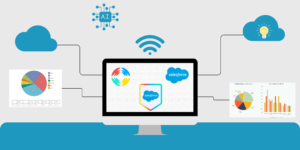Imagine walking into your office on a Monday morning with a brilliant idea that could revolutionize your team’s workflow. In the past, turning that idea into a functional app would’ve meant weeks, if not months, of development time, countless meetings with IT, and a significant budget allocation. But what if you could bring that idea to life by the end of the week—all without writing a single line of code?

Welcome to the era of no-code and low-code development, where platforms like Salesforce are putting the power of app creation directly into the hands of everyday business users. It’s not just a technological advancement; it’s a paradigm shift that’s democratizing innovation across industries.
The Rise of the Citizen Developer
Meet Alex, a marketing manager at a bustling retail company. Frustrated by the clunky process of tracking campaign performance across multiple platforms, Alex dreamed of a centralized dashboard that could automate data collection and provide real-time insights. Without any formal coding skills, this seemed like a distant possibility—that is, until Alex discovered Salesforce’s no-code tools like Flow and App Builder.
Using these intuitive, drag-and-drop platforms, Alex designed a custom app that not only streamlined data tracking but also automated routine tasks. The result? Increased efficiency, better decision-making, and a newfound passion for innovation.
Alex is what’s known as a “citizen developer.” These are professionals who, armed with no-code and low-code tools, are creating solutions tailored to their unique challenges—without relying on traditional IT support. And they’re not alone. Businesses worldwide are witnessing a surge of such innovators who are transforming ideas into reality at an unprecedented pace.
From Concept to Creation in Record Time
In today’s fast-paced business environment, agility is more than a buzzword; it’s a necessity. Customer expectations are evolving rapidly, and the ability to adapt can make or break a company’s success. No-code platforms empower businesses to respond to these changes swiftly.
Consider a sales team that’s grappling with inefficient lead management. Traditionally, they’d submit a request to the IT department and wait weeks for a solution. Now, with no-code tools, the sales manager can personally create an automated workflow. Within hours, they can set up processes that send follow-up reminders, update lead statuses, and log interactions—all without writing code.
This speed doesn’t just save time; it fosters a culture of innovation. Teams aren’t bogged down waiting for solutions—they’re proactively creating them. Rapid prototyping and deployment mean ideas can be tested, refined, and implemented faster than ever before.
Customization Without Complexity
One of the standout advantages of no-code development is the ability to customize solutions without getting entangled in complex coding. In the past, even minor tweaks to software required a developer’s expertise, often leading to delays and additional costs.
With tools like Salesforce’s App Builder, users can tailor apps to their exact needs using a simple interface. It’s like building with digital Lego blocks—you can assemble, disassemble, and rearrange components to create something uniquely yours.
For instance, a healthcare provider might need a patient management system that adheres to strict privacy regulations and caters to specific workflows. Rather than settling for a one-size-fits-all software or investing heavily in custom development, they can use no-code tools to build a solution that fits like a glove.

Scalable Solutions for the Whole Team
What’s more exciting is how these individualized solutions can scale across entire organizations. Once an app or workflow is built, it can be shared, adapted, and utilized by other teams, amplifying its impact.
Platforms like Salesforce’s AppExchange offer a plethora of pre-built components and templates. Users can leverage these resources to accelerate development, customizing them as needed. It’s collaborative innovation at its finest—building upon shared knowledge to achieve greater efficiency.
This approach also alleviates pressure on IT departments. By handling everyday process improvements themselves, business users free up IT professionals to focus on more complex projects that require specialized expertise.
The Future Is No-Code
The shift toward no-code and low-code development isn’t just a fleeting trend; it’s shaping the future of how businesses operate. As these tools become more sophisticated, the line between technical and non-technical roles blurs.
Imagine a company where every employee, regardless of their department, feels empowered to innovate. Problems are solved at the source, by the people who understand them best. This not only boosts morale but also drives the company forward in ways previously unimagined.

Breaking Down Barriers to Innovation
At its core, the no-code movement is about accessibility. It’s about tearing down the barriers that once separated ideas from execution. No longer is app development confined to those with years of coding experience. With platforms like Salesforce leading the charge, creativity and problem-solving are the only prerequisites.
This democratization of technology ensures that businesses remain agile and competitive. It fosters a culture where initiative is rewarded, and innovation is a collective endeavor.
Your Turn to Build
So, where does this leave you? Whether you’re a marketer, a salesperson, a customer support representative, or in any role that grapples with daily challenges, no-code tools offer a new avenue to explore solutions.
Think about the processes that slow you down. The data that’s hard to track. The tasks that could be automated. With a bit of imagination and the right tools, you have the power to transform them.
The world of no-code and low-code development is opening doors for professionals across all industries. It’s not just changing how we build software; it’s changing who builds it.
Embrace the Revolution
The message is clear: innovation is no longer confined to the IT department. With no-code platforms, we’re witnessing a shift where the best solutions come from those who experience the problems firsthand.
Salesforce’s commitment to this movement is evident in the robust, user-friendly tools they’ve developed. By putting these resources into the hands of business users, they’re not just enhancing productivity—they’re igniting a revolution.
So, the next time you have that spark of an idea, remember that you’re more empowered than ever to make it a reality. The tools are at your fingertips, and the only limit is your imagination.
Welcome to the new era of innovation. It’s time to build.

